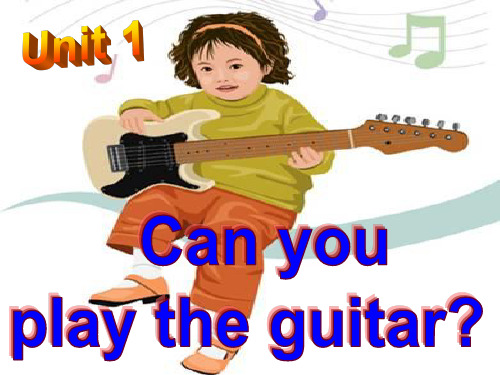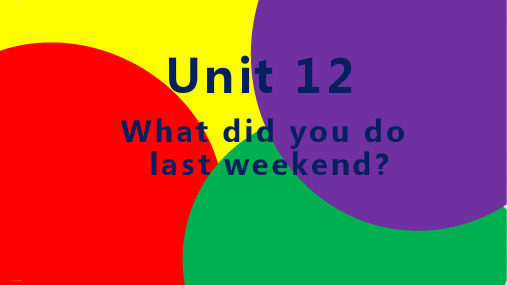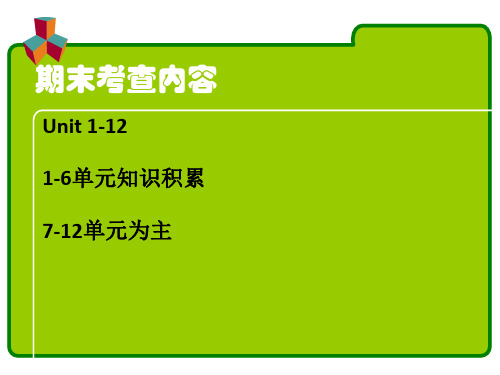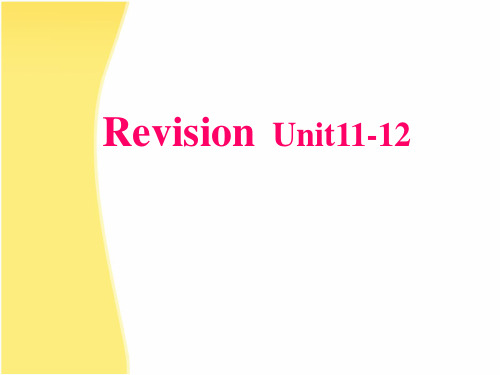人教版七年级下册英语总复习课件
合集下载
人教版七年级英语下册知识点总结总复习Unit7 It’s raining(共76张PPT)

教学重难点
1. 询问天气的情况的两种表达方式。 2.表示天气的词,名词与形容词的转化 3.take a message 4.形容词的用法。 5.work的用法。 6.just right for doing sth. 7.have a good time in doing sth. 8.tell sb to do sth.
—Can you make a kite? —No problem.
8.have a good/great time=have fun =enjoy oneself
(oneself要随主语的变化而变化) I'm having a good/great time. He enjoys himself in learning English.
5. buy bread to take home,
6. wear hats and sweaters,
7. play in the snow, 8. skate on a river,
9. have fun,
10. be relaxing here,
11. see you soon
课时重点回顾
- How’s the weather? - It’s raining./It’s cloudy./It’s sunny. - What are you doing? - I’m watching TV./I’m cooking. - What’s he doing? - He’s studying at his friend’s home. - What are they doing? - They’re playing basketball in the park. - How’s it going? - Great./Not bad./Terrible!
unit 4【复习课件】七年级英语下册单元复习(人教版)

别把脏碗留在厨房里!
10. I can’t relax on weekends __e_it_h_e_r___ _b_e_c_a_u_se___ I have to
learn to play the piano. 周末我也不能放松, 因为我不得不去学习弹钢琴。
重点语法
祈使句
用于表达命令、请求、劝告、警告、禁止等的句子称为 祈使句。祈使句最常用于表达命令。祈使句因对象(即主语) 是第二人称, 所以通常省略主语而以动词原形开头。祈使句句 末使用句号或感叹号。为表示语气委婉, 可在句首或句尾加 please, please放在句尾时, 前面通常加逗号。
Let me help you. 让我来帮你。
重点语法
祈使句
考题:[ 广元] —________ silent, please! You are in the library.
—I’m sorry, madam.
A. Keep
B. To keep
C. Keeping
D. Kept
重点语法
祈使句
否定祈使句的形式:
重点单词
1. rule n. 规则; 规章→____s_c_h_o_o_l_r_u_le_s___学校规则 2. arrive v. 到达→ ___a_r_r_iv_e__in_/_a_t._..__到达……
→ar_r_i_v_e_l_a_te__fo_r__sc_h上oo学l 迟到 3. fight v.& n. 打架; 战斗→ __f_ig_h__t _a_g_a_in_s_t_s_b_.和某人打斗→
→_____fo_l_lo_w__in_g____n. 下列事物
重点单词
30. learn v. 学习; 学会→ _le_a_r_n__to__d_o_s_t_h_.____学习做某事 → ____l_ea_r_n__fr_o_m__s_b_.向某人学习 → ____l_e_a_rn__a_b_o_u_t了解; 获悉
10. I can’t relax on weekends __e_it_h_e_r___ _b_e_c_a_u_se___ I have to
learn to play the piano. 周末我也不能放松, 因为我不得不去学习弹钢琴。
重点语法
祈使句
用于表达命令、请求、劝告、警告、禁止等的句子称为 祈使句。祈使句最常用于表达命令。祈使句因对象(即主语) 是第二人称, 所以通常省略主语而以动词原形开头。祈使句句 末使用句号或感叹号。为表示语气委婉, 可在句首或句尾加 please, please放在句尾时, 前面通常加逗号。
Let me help you. 让我来帮你。
重点语法
祈使句
考题:[ 广元] —________ silent, please! You are in the library.
—I’m sorry, madam.
A. Keep
B. To keep
C. Keeping
D. Kept
重点语法
祈使句
否定祈使句的形式:
重点单词
1. rule n. 规则; 规章→____s_c_h_o_o_l_r_u_le_s___学校规则 2. arrive v. 到达→ ___a_r_r_iv_e__in_/_a_t._..__到达……
→ar_r_i_v_e_l_a_te__fo_r__sc_h上oo学l 迟到 3. fight v.& n. 打架; 战斗→ __f_ig_h__t _a_g_a_in_s_t_s_b_.和某人打斗→
→_____fo_l_lo_w__in_g____n. 下列事物
重点单词
30. learn v. 学习; 学会→ _le_a_r_n__to__d_o_s_t_h_.____学习做某事 → ____l_ea_r_n__fr_o_m__s_b_.向某人学习 → ____l_e_a_rn__a_b_o_u_t了解; 获悉
人教版7年级下英语各单元总复习课件

某人谈论某事
12.善于应付……的 __________________ be good with…
词汇训练营
快速回忆所学单词,看谁说得又快又准!
13.结交朋友
make friends _____________ help(sb)with sth ________________ on the weekend ________________ teach _____________
14.在某方面帮助(某人)(v. )
15.在周末
16.教;讲授(v. )
musician 17.音乐家(n. )__________
词汇训练营
单词填空,考查综合运用能力!
二、用所给单词的适当形式填空。 speaks 1. Mr. Green ___________(speak) English very well. to join (join) the music club? 2. Does his sister want________
句型大闯关
本单元重点句子有哪些?看谁说得多!
6. Students wanted for school show.学校演出需要招聘学生。 这是一句省略句,一般用于标题中,完整的句子是:Students are wanted for school show.如: An English teacher wanted for our school. 我们学校需要一名英语老师。 show可以作名词,意思是“表演;展览”;也可作动词,意思 是“出示;给……看”。如: (1)We often go to see a monkey show in the park. 我们经常去动物园看猴子表演。 (2)Can you show your new pen to me? 你能把你的新钢笔给我看吗? 7. I like to play basketball.我喜欢打篮球。 like 表示喜欢, like to do sth. 特定的喜欢做某事 like doing sth. 表示一个人的爱好
12.善于应付……的 __________________ be good with…
词汇训练营
快速回忆所学单词,看谁说得又快又准!
13.结交朋友
make friends _____________ help(sb)with sth ________________ on the weekend ________________ teach _____________
14.在某方面帮助(某人)(v. )
15.在周末
16.教;讲授(v. )
musician 17.音乐家(n. )__________
词汇训练营
单词填空,考查综合运用能力!
二、用所给单词的适当形式填空。 speaks 1. Mr. Green ___________(speak) English very well. to join (join) the music club? 2. Does his sister want________
句型大闯关
本单元重点句子有哪些?看谁说得多!
6. Students wanted for school show.学校演出需要招聘学生。 这是一句省略句,一般用于标题中,完整的句子是:Students are wanted for school show.如: An English teacher wanted for our school. 我们学校需要一名英语老师。 show可以作名词,意思是“表演;展览”;也可作动词,意思 是“出示;给……看”。如: (1)We often go to see a monkey show in the park. 我们经常去动物园看猴子表演。 (2)Can you show your new pen to me? 你能把你的新钢笔给我看吗? 7. I like to play basketball.我喜欢打篮球。 like 表示喜欢, like to do sth. 特定的喜欢做某事 like doing sth. 表示一个人的爱好
人教版七年级英语下册复习课件Unit2 What time do you go to school(24张PPT)

Activity get up
7:30
have breakfast
8:00--11:00 12:00
14:00--17:00
do homework have lunch play football with friends
18:00
have supper
19:00--21:00 21:30
watch TV at home go to bed
work 是
,表示“工作,劳动”,抽象概念。
指日常生活工作中各类体力脑力劳动。也可作动词。
go to work after work
eg : He found a job in Beijing.
He has a lot of work to do every day.
My father works in a hospital.
It’s nine fourtryt.y.
I go to school at seven o’clock.
我在七点钟去上学。
go to school
去上学
at seven o’clock
在七点钟
at + 时间点 :在....... (点)
I go to school at seven o’clock. (对划线部分提问)
逆读法: 借助介词past或to 。 (1) 分钟数为30, ….点半:
6:30 half past six 5:30 half past five (2) 分钟数不到30, …点过…分: 6:05 five past six 6:10 ten past six 6:15 a quarter past six (3)分钟数超过30, 差…分…点:(60— 分钟)+to+(小时+1) 6:45 a quarter to seven 6:50 ten to seven
最新人教版七年级英语下册 全册PPT课件全集(443张)

join 表示“参加;加入”,此处指加入 社团或组织,成为其中的成员。例如:
join the army 参军 join the Young Pioneer 加入少先队 join the NBA 加入美职篮
4. You are very good at telling stories. 你很擅长讲故事。 be good at sth./doing sth. … 表示“擅 长于 ……; 精通 ……”, 后面可接名词 或动词的ing形式。例如: Mr Li is good at languages. He can speak eight languages.
play basketball 打篮球 play 后跟乐器时,要加定冠词 the。如: play the guitar 弹吉它
play the piano 弹钢琴
3. I want to join the art club. 我想参加美术社团。 club 表示“俱乐部”或“社团”。在
英、 美等国,中小学校会组织各类 俱乐部 来提高学生的兴趣及才能,丰 富他们 的文化生活。相当于我国中小 学校中 的“兴趣小组”。
• 5. Well, you can join the _s_w_i_m__m_i_n_g_ (swim)
club.
• 6. Janew__a_n_ts_ (want) to join a sports club.
三、选词填空。
club can’t sounds like
speak can sports draw
Read the conversation in 2d. Fill in the chart.
Name what can does
clubs
Bob play soccer a sports club
(完整版)人教版初中七年级下册英语PPT资料

tell sb. 告诉某人; tell sb. to do sth. 告诉某人做某事 Let’s go and tell our teacher. 我们去告诉老师吧。
Tell Eric to bring his basketball to school. 告诉埃里克把他的篮球带到学校来。
3) say 说(强调所说的内容,常跟一句子) Mr. Lin says “I’m your new teacher. ” 林老师说,“我是你们的新老师。” “I don’t know.” Linda say. 琳达说:“我不知道。”
4. and 和 or 的用法辨析。 1) and 和、且(用于肯定句中)
Tom and Jack can play soccer well. 汤姆和杰克能打足球打得很好。 2) or 或者; 也不(用于疑问句中或否定句中) Can you sing or dance? 你会唱歌还是跳舞?
My sister can’t play basketball or soccer. 我姐姐不会打篮球也不会踢足球。
I can swim well. My brother can also swim well. 我游泳很好,我弟弟游泳也很好。 Mike is also in the soccer club. 迈克也在足球俱乐部。 Her sister can play chess, too. 她妹妹也会下棋。
2. help (sb.) with sth. 在某方面帮某助某人
_Y_e_s_, _w_e__ca_n__. ___________
3. — 她会下棋吗? _C_a_n__s_h_e_p_l_a_y_c_h_e_s_s_?
— 不会。
_N_o_,_s_h_e__ca_n__’t_._____
Unit 9【复习课件】七年级英语下册单元复习(人教版)

询问某人的身高或某物的高度是多少时, 常用“What’s the
height of... ?” 或“What’s one’s height ?”, 相当于“How
high/tall is ... ?”。
她中等身高,并留着长长的直发。
2. ___I_s____ David tall or short? 戴维是高还是矮?
3. He has short curly brown hair. 他有一头短而卷曲的棕色头发。
重点句子
4. —___D_o___ they __h_a_v_e__ straight or curly hair?
18. describe v. 描述
→ _d_e_s_c_r_ib_e__sb__. _/s_t_h_. _to__sb__. 向某人描述某人/ 某物
19. another adj. & pron. 另一; 又一
重点单词
20. nose n. 鼻子→ __b_i_g_n_o_s_e____ 大鼻子 21. mouth n. 嘴→ _b_i_g_m__o_u_t_h___ 大嘴 22. round adj. 圆形的→ _a_r_o_u_n_d__ (到处; 在附近) 23. face n. 脸→ __r_o_u_n_d_f_a_c_e__ 圆脸 24. eye n. 眼睛→ __e_y_e_s___ (复数) 25. singer n. 歌手→ __s_in_g____ v. 唱; 演唱 26. in the end 最后 → __a_t__la_s_t__(同义词) → __a_t_f_i_rs_t__(反义词)
重点语法
考点1;形容词的用法 形容词通常在句中作定语、表语和宾语补足语等。 e.g. She is a beautiful girl. 她是一个漂亮的姑娘。(定语)
人教版人教版七年级英语下册Unit复习课件PPT共张PPT

took was put made sat
人教版人教版七年级英语下册Unit复 习课件P PT共张 PPT
人教版人教版七年级英语下册Unit复ห้องสมุดไป่ตู้习课件P PT共张 PPT
原形 get shout look start wake tell
过去式 got
shouted looked started woke
Who did she go with?
She went with her classmates.
人教版人教版七年级英语下册Unit复 习课件P PT共张 PPT
3b
Read and retell the story about the family of mice.
A family of mice were in the kitchen on Saturday morning when they ___s_a_w____ a big cat. Baby Mouse ____w__a_s__ afraid and _c_l_im__b_e__d_ onto his father’s back. Father Mouse shouted at the cat, “Woof, wood!” The cat quickly _ra_n__a_w__a_y_. “Wow, Dad, you’re good!” ____s_a_id___ the Baby Mouse. “Well, son, that’s why it is important to learn a second language,” answered Father Mouse.
told
人教版人教版七年级英语下册Unit复 习课件P PT共张 PPT
人教版人教版七年级英语下册Unit复 习课件P PT共张 PPT
人教版人教版七年级英语下册Unit复ห้องสมุดไป่ตู้习课件P PT共张 PPT
原形 get shout look start wake tell
过去式 got
shouted looked started woke
Who did she go with?
She went with her classmates.
人教版人教版七年级英语下册Unit复 习课件P PT共张 PPT
3b
Read and retell the story about the family of mice.
A family of mice were in the kitchen on Saturday morning when they ___s_a_w____ a big cat. Baby Mouse ____w__a_s__ afraid and _c_l_im__b_e__d_ onto his father’s back. Father Mouse shouted at the cat, “Woof, wood!” The cat quickly _ra_n__a_w__a_y_. “Wow, Dad, you’re good!” ____s_a_id___ the Baby Mouse. “Well, son, that’s why it is important to learn a second language,” answered Father Mouse.
told
人教版人教版七年级英语下册Unit复 习课件P PT共张 PPT
人教版七年级英语下册Unit4复习课件

—Do my homework, of course.
A. What
B. When
C. Where D. How
4. —
late for school again.
—Sorry, I won’t.
A. Not be B. Don’t be C. Not D. Don’t
5. Which of the following pictures means“Please be quiet”?
【用法辨析】listen与hear的区别
【活学活用】
Байду номын сангаас
①听! 你能听见汤姆正在唱歌吗?
! Can you
Tom singing now?
②不要在会上听收音机。
Don’t
the radio in the meeting.
答案: ①Listen; hear ②listen to
4. We can’t wear a hat in our school. 在我们学校里不允许戴帽子。 【自主领悟】wear“穿; 戴”, 表示状态。相当于be in。例如: He is wearing a black T-shirt. 他穿着一件黑色的T恤衫。
【归纳拓展】before的其他用法
【活学活用】
①She always says goodbye to her mother before
(go)to school.
②He always washes his feet
he goes to bed.
A. after
B. because
C. if
D. before
his workers and he is
also strict
Unit 2【复习课件】七年级英语下册单元复习(人教版)

Biblioteka 重点语法 询问时间与时间表达法
考点3;时间的表达法
分类
用法
例子
整点法
时间为整点时, 可用“整点数 It’s five o’clock./It’s five. +o’clock”表示, o’clock 可省略。 现在 5 点(整) 。
“先时后分”, 先读整点数, 再
顺读法
读分钟数, 都用基数词来读。 当分钟数小于10 时, 遇到数字
→ _s_o_m_e__b_r_u_s_h_es
一些刷子
11. tooth n. 牙齿→ ___t_e_e_th____(复数形式)
12. shower n.&v. 淋浴; n. 淋浴器(间)
13. fifty num. 五十→ ___f_iv_e_____五→ __f_if_t_e_e_n___十五
0, 发字母 o 的音/əʊ/。
6:30 为 six thirty 2:58 为 two fifty-eight 4:05 为 four o (/əʊ/) five
重点语法 询问时间与时间表达法
分类
用法
例子
a. 分钟数小于 30 时, 用“分钟数 +past+ 整点数”表示; b. 分钟数为 30 时, 用“half past+ 整 点数”表示; 逆读法 c. 分钟数超过 30 时, 用“60 减去分 钟数+to+ 下一个整点数”表示; d. 分钟数是 15 的倍数时, 可用 quarter表示。
地→__q__u_ic_k___ (形容词) 很快的 26. either conj. 或者 adv. 也→ ___to__o____ (同义词) 27. lot pron. 大量; 许多→___a_l_o_t_o_f___许多
考点3;时间的表达法
分类
用法
例子
整点法
时间为整点时, 可用“整点数 It’s five o’clock./It’s five. +o’clock”表示, o’clock 可省略。 现在 5 点(整) 。
“先时后分”, 先读整点数, 再
顺读法
读分钟数, 都用基数词来读。 当分钟数小于10 时, 遇到数字
→ _s_o_m_e__b_r_u_s_h_es
一些刷子
11. tooth n. 牙齿→ ___t_e_e_th____(复数形式)
12. shower n.&v. 淋浴; n. 淋浴器(间)
13. fifty num. 五十→ ___f_iv_e_____五→ __f_if_t_e_e_n___十五
0, 发字母 o 的音/əʊ/。
6:30 为 six thirty 2:58 为 two fifty-eight 4:05 为 four o (/əʊ/) five
重点语法 询问时间与时间表达法
分类
用法
例子
a. 分钟数小于 30 时, 用“分钟数 +past+ 整点数”表示; b. 分钟数为 30 时, 用“half past+ 整 点数”表示; 逆读法 c. 分钟数超过 30 时, 用“60 减去分 钟数+to+ 下一个整点数”表示; d. 分钟数是 15 的倍数时, 可用 quarter表示。
地→__q__u_ic_k___ (形容词) 很快的 26. either conj. 或者 adv. 也→ ___to__o____ (同义词) 27. lot pron. 大量; 许多→___a_l_o_t_o_f___许多
人教版英语七年级下册Unit9 单元整体复习课件 34PPT

1.—What does your Chinese teacher __l_o_o_k__li_k_e___, Jenny? —She is tall with long black hair.
2.Kate and Linda makes tea _th_e__s_a_m_e__w_a_y_, but Linda makes it better. 3.My brother plays soccer well and he also likes watching soccer games _o_n_t_e_l_e_v_is_i_o_n_. 4.The child wants to _w_e_a_r_g_l_a_s_s_e_s_ because he thinks he looks cool with glasses. 5.__In__t_h_e_e_n_d___, David finds Chinese is really interesting.
选词填空
1. Paul has _______ (little/few) friends here, so he often feels lonely. 2. There is only_______(a little/ a bit) water in the bottle. 3. The ______ (person / people) in a sweater is a worker. 4. The Chinese ______ (persons / people) are hard-working and friendly. 5. There are many trees and flowers on ______ (each/ every) side of the street. 6. In our school, the students _______ (every / each) has an ID card. 7. ______(Maybe/May be) he is a teacher. 8. He ______ (maybe/ may be) a teacher. 9. The mountain is very ______ (tall/high). 10. Most British high school children_______ (dress/ wear/ put on) uniforms(制服) at school.
2.Kate and Linda makes tea _th_e__s_a_m_e__w_a_y_, but Linda makes it better. 3.My brother plays soccer well and he also likes watching soccer games _o_n_t_e_l_e_v_is_i_o_n_. 4.The child wants to _w_e_a_r_g_l_a_s_s_e_s_ because he thinks he looks cool with glasses. 5.__In__t_h_e_e_n_d___, David finds Chinese is really interesting.
选词填空
1. Paul has _______ (little/few) friends here, so he often feels lonely. 2. There is only_______(a little/ a bit) water in the bottle. 3. The ______ (person / people) in a sweater is a worker. 4. The Chinese ______ (persons / people) are hard-working and friendly. 5. There are many trees and flowers on ______ (each/ every) side of the street. 6. In our school, the students _______ (every / each) has an ID card. 7. ______(Maybe/May be) he is a teacher. 8. He ______ (maybe/ may be) a teacher. 9. The mountain is very ______ (tall/high). 10. Most British high school children_______ (dress/ wear/ put on) uniforms(制服) at school.
人教版七年级英语下学期期末总复习重点知识汇总-(共64张PPT)

His brother often makes him stay in the sun.
…To do/doing 两种用法பைடு நூலகம்
• find/see/ sb. do sth. → 观看/看见某人做某事 I saw you pick an apple just now. • find/see/sb. doing sth. → 观看/看见某人正在做某事 I saw you playing basketball with your classmates o
非谓语动词
• help sb. to do sth. →帮助某人做某事 Lucy often helps Lily to wash her clothes.
• help sb. do sth. →帮助某人做某事 He usually helps me learn English.
• help sb. with sth. →帮助某人做某事 I sometimes help my mother with the housework.
• take sb. to sp→带某人到某地 Mr. Wang took us to the Summer Palace last Sunday.
可跟双宾语的动词
• show sb. Sth→给某人看某物 Please show me the map. show sth. to sb. →把某物给某人看 Please show the map to me.
• buy sb. sth. →为某人买某物 Mother bought me a bike.
• buy sth. for sb. →为某人买某物 Mother bought a bike for me.
• give sb. sth →把某物给某人 Jim gave me an English dictionary.
…To do/doing 两种用法பைடு நூலகம்
• find/see/ sb. do sth. → 观看/看见某人做某事 I saw you pick an apple just now. • find/see/sb. doing sth. → 观看/看见某人正在做某事 I saw you playing basketball with your classmates o
非谓语动词
• help sb. to do sth. →帮助某人做某事 Lucy often helps Lily to wash her clothes.
• help sb. do sth. →帮助某人做某事 He usually helps me learn English.
• help sb. with sth. →帮助某人做某事 I sometimes help my mother with the housework.
• take sb. to sp→带某人到某地 Mr. Wang took us to the Summer Palace last Sunday.
可跟双宾语的动词
• show sb. Sth→给某人看某物 Please show me the map. show sth. to sb. →把某物给某人看 Please show the map to me.
• buy sb. sth. →为某人买某物 Mother bought me a bike.
• buy sth. for sb. →为某人买某物 Mother bought a bike for me.
• give sb. sth →把某物给某人 Jim gave me an English dictionary.
人教版七年级英语下册综合复习ppt课件

61. _r_u_n_a_w__a_y__________ 跑开
经营者提供商品或者服务有欺诈行为 的,应 当按照 消费者 的要求 增加赔 偿其受 到的损 失,增 加赔偿 的金额 为消费 者购买 商品的 价款或ห้องสมุดไป่ตู้接受服 务的费 用
辨析
cross/across/through/over/past
cross表示穿过,相当于go across。 across为介词,表示“从……表面穿过”,或“横
穿”。 across from 在……对面 through为介词,表示“从……内部穿过”,往往指穿
过沙漠、森林,(光线)透过窗户等。
经营者提供商品或者服务有欺诈行为 的,应 当按照 消费者 的要求 增加赔 偿其受 到的损 失,增 加赔偿 的金额 为消费 者购买 商品的 价款或 接受服 务的费 用
over为介词,意为“翻越”,表示到达高的 障碍物(如树、墙、篱笆和山脉等)的另一侧。 past为介词,意为“走过,经过”,指从某 特或某人旁边经过。 walk/ go past (=pass)
经营者提供商品或者服务有欺诈行为 的,应 当按照 消费者 的要求 增加赔 偿其受 到的损 失,增 加赔偿 的金额 为消费 者购买 商品的 价款或 接受服 务的费 用
51. _e_n_jo_y__r_e_a_d_in_g_____ 喜欢阅读 52. _p_u_t_u_p__te_n_t_s_____ 搭起帐篷 53. _fi_n_i_sh__h_i_g_h_s_c_h_o_o_l 中学毕业 54. _fl_y_a__k_i_te________ 放风筝 55. _g_e_t _a_s_u_r_p_r_i_se_____ 吃惊 56. _g_o_a_l_o_n_g_t_h_e__st_r_e_e_t 沿着这条街走 57. _in__o_n_e_g_o_________ 同一次,一次性地 58. _lo_o_k__o_u_t_o_f_______ 向…外看 59. _m_a_k_e__a_f_i_re_______ 生火 60. _r_id_e__a_h_o_r_s_e______ 骑马
经营者提供商品或者服务有欺诈行为 的,应 当按照 消费者 的要求 增加赔 偿其受 到的损 失,增 加赔偿 的金额 为消费 者购买 商品的 价款或ห้องสมุดไป่ตู้接受服 务的费 用
辨析
cross/across/through/over/past
cross表示穿过,相当于go across。 across为介词,表示“从……表面穿过”,或“横
穿”。 across from 在……对面 through为介词,表示“从……内部穿过”,往往指穿
过沙漠、森林,(光线)透过窗户等。
经营者提供商品或者服务有欺诈行为 的,应 当按照 消费者 的要求 增加赔 偿其受 到的损 失,增 加赔偿 的金额 为消费 者购买 商品的 价款或 接受服 务的费 用
over为介词,意为“翻越”,表示到达高的 障碍物(如树、墙、篱笆和山脉等)的另一侧。 past为介词,意为“走过,经过”,指从某 特或某人旁边经过。 walk/ go past (=pass)
经营者提供商品或者服务有欺诈行为 的,应 当按照 消费者 的要求 增加赔 偿其受 到的损 失,增 加赔偿 的金额 为消费 者购买 商品的 价款或 接受服 务的费 用
51. _e_n_jo_y__r_e_a_d_in_g_____ 喜欢阅读 52. _p_u_t_u_p__te_n_t_s_____ 搭起帐篷 53. _fi_n_i_sh__h_i_g_h_s_c_h_o_o_l 中学毕业 54. _fl_y_a__k_i_te________ 放风筝 55. _g_e_t _a_s_u_r_p_r_i_se_____ 吃惊 56. _g_o_a_l_o_n_g_t_h_e__st_r_e_e_t 沿着这条街走 57. _in__o_n_e_g_o_________ 同一次,一次性地 58. _lo_o_k__o_u_t_o_f_______ 向…外看 59. _m_a_k_e__a_f_i_re_______ 生火 60. _r_id_e__a_h_o_r_s_e______ 骑马
人教版七年级英语下册 Unit4总复习课件

can 能,会 (表示能力) —Can you play basketball? —Yes, I can. 你会打篮球吗? 是的, 我会。
have to 必须,不得不 don’t / doesn’t have to 不必
你不必在上午七点前到校。 You don’t have to be school before 7:00.
考点7
祈使句
1.祈使句是表示命令、叮嘱、号召等的句子; 2.通常省略主语you; 3.句中谓语动词用动词原形; 4.祈使句有肯定和否定两种:
否定
Don’t eat in class. Don’t play sports in the classroom. Don’t fight.
肯定
Come in, please! 请进! Sit down, please. 请坐。
违规 break rules
3.考点归纳
考点1
arrive in / at与get to 的区别
① My father arrived in / got to Beijing this morning.
我爸爸今天上午到达了北京。
② The farmer arrived at / got to an old house and knocked at
(be) on time be late for … in class listen to … dining hall eat outside bring … to … have to wear the school uniform go out see friends practice the guitar
26.遵循;跟随v.
follow
27.幸运;运气n.
have to 必须,不得不 don’t / doesn’t have to 不必
你不必在上午七点前到校。 You don’t have to be school before 7:00.
考点7
祈使句
1.祈使句是表示命令、叮嘱、号召等的句子; 2.通常省略主语you; 3.句中谓语动词用动词原形; 4.祈使句有肯定和否定两种:
否定
Don’t eat in class. Don’t play sports in the classroom. Don’t fight.
肯定
Come in, please! 请进! Sit down, please. 请坐。
违规 break rules
3.考点归纳
考点1
arrive in / at与get to 的区别
① My father arrived in / got to Beijing this morning.
我爸爸今天上午到达了北京。
② The farmer arrived at / got to an old house and knocked at
(be) on time be late for … in class listen to … dining hall eat outside bring … to … have to wear the school uniform go out see friends practice the guitar
26.遵循;跟随v.
follow
27.幸运;运气n.
人教版七年级下册英语:Unit11-12复习课件

3,Tom ____ stand the boring lesson.
I can’t stand them,______.
A. can,too
B. doesn’t ,too
C. doesn’t ,either D. can’t, either
4._____ are you talking to? A. What B. Who C. Where 5.____healthy food is good for us. A. Eat B. Ate C. Eating 6.Thanks for ______ me a hand . A give B. giving C. to give
3. 一个十三岁的男孩 a thirteen-year-old boy
4. 做…怎么样?How/ What about doing sth?
5. 为…而感谢 Thanks for doing sth.
6. 介意做某事 mind doing sth
7. 忍受做某事 stand doing sth
8. 把…给…看 show sth to sb
_____. 3T、ak晚in饭g 后a散步对w健alk康有益。
health
______ _____ ______after supper is good for______.
4W、h他at们对每样东西th的ink看法of如何?
5、他们中的一些答案使我们大感意外。 __S_o__m_e_ _o_f___their answers _s_u__rp__ri_s_e_d__ us. 6、我家乡的每个人都很友好。 E_v_e_r_y_o_ne in my hometown __i_s___very _fr_i_e_n_d_l_y. 7、我们喜欢在课堂上用英语问问题。 We enjoy__a_s__k_in_g__ q__u_e_s_t_io_n_s__w_i_t_h___ E__n_g_li_s_h__in class. 8、麻烦你把这件事告诉他好吗? Can you___m_i_n_d__ _te_l_l_in_g___him about this?
人教版七年级下册英语Unit5 --6单元整体复习课件

01
Words and expressions
Words
写出相应的英文单词:
1.熊猫 ____________ 2.动物园____________ 3.老虎____________ 4.大象____________ 5.树袋熊;考拉____________ 6.狮子 ____________ 7.长颈鹿____________ 8.动物 ____________ 9.可爱的;机灵的___________ 10. 懒散的;懒惰的____________
1112..玛来丽到的__话_____________________________1_4.one of… ……的其中之一
13.拯救大象_______________1_5.a symbol of… ……的标志/象征
1145..…………的的其标中志之/象一征________________1__6__.____g__o__o__d__luck 祝好运
7. 我们的第一面国旗上就绘着一头白象。 Our ________ ______核__对h你ad的a答w案hite elephant on it. 8.人们说“大象从来7不.会O忘ur记fir”s。t flag had a white elephant on it. People say that “an e8le.phPaenopt l_e_s_a_y_t_h_a_t _“_a_n_e_le_p_h_a.”nt never forgets.” 9.大象能够长时间行9走.,Ele而ph且an不ts迷ca路n w。alk for a long time and never get lost. Elephants can walk f1o0r.a B__u_t_e_le_p_h_a_n_ts__a_re__in_ garnedatndeavnerge_r_. ______ ________. 10. 但是大象面临巨大1的1.危W险e 。must save the trees and not buy things made of ivory. But elephants are ________ ________ ________. 11.我们必须拯救树木,拒买象牙制品。 We must save the trees and not buy things ________ ________ ivory.
人教版七年级英语下册【复习课件】ppt

A.has B.will have C.is having
二、祈使句
无人称、动词开头, 带命令色彩的句子。
肯 Open the window, please. 定 Look at here. 式 Please read after me.
否 Don’t open the window. 定 Don’t look at here. 式
be + doing
Don’t do sth. 后的句子 一般过去 yesterday..., just now,
...ago, this morning,
过去式
When I was young,
否定句、一般疑问句的结构
句中有be,could,can,may,must, would 的变法
否定句
一般疑问句
只在其后+not (some-any) 将其放到句首...+?
句中没有be,could,can,may,must,would 的变法
动词
否定句
一般疑问句
原形 在主语后+don’t Do句前 + …+?
第三人 在主语后+doesn’t Does句前+… +动词原
称单数 +动词原形
形+?
过去式 在主语后+didn’t Did句前+…+动词原形
• P用a双ss手so把m物et品hin递g给to老ol人d 。people with both hands.
二、话题
1.天气及季节 2.学校生活(交通) 3.居住环境 4.生日
三、句型 (及交际用语)
1.某人用多长时间/多少钱做某事: It takes/took sb. + 时间/钱 + to do sth.
He said that the earth _B__round the sun.
二、祈使句
无人称、动词开头, 带命令色彩的句子。
肯 Open the window, please. 定 Look at here. 式 Please read after me.
否 Don’t open the window. 定 Don’t look at here. 式
be + doing
Don’t do sth. 后的句子 一般过去 yesterday..., just now,
...ago, this morning,
过去式
When I was young,
否定句、一般疑问句的结构
句中有be,could,can,may,must, would 的变法
否定句
一般疑问句
只在其后+not (some-any) 将其放到句首...+?
句中没有be,could,can,may,must,would 的变法
动词
否定句
一般疑问句
原形 在主语后+don’t Do句前 + …+?
第三人 在主语后+doesn’t Does句前+… +动词原
称单数 +动词原形
形+?
过去式 在主语后+didn’t Did句前+…+动词原形
• P用a双ss手so把m物et品hin递g给to老ol人d 。people with both hands.
二、话题
1.天气及季节 2.学校生活(交通) 3.居住环境 4.生日
三、句型 (及交际用语)
1.某人用多长时间/多少钱做某事: It takes/took sb. + 时间/钱 + to do sth.
He said that the earth _B__round the sun.
- 1、下载文档前请自行甄别文档内容的完整性,平台不提供额外的编辑、内容补充、找答案等附加服务。
- 2、"仅部分预览"的文档,不可在线预览部分如存在完整性等问题,可反馈申请退款(可完整预览的文档不适用该条件!)。
- 3、如文档侵犯您的权益,请联系客服反馈,我们会尽快为您处理(人工客服工作时间:9:00-18:30)。
here. They are enjoying (enjoy) the sun. Some are looking (look) at the buildings and some are listening (listen) to the guide. Dad: Are you having (you/have) a good time? Tony: Yes, we are having (have) a great time, Dad! See
❖ 1.Li Lei ___B___ doing his homework.
❖ A. am B. is C. are
❖ 2..Are you ___B____ photos ?
❖ A. take B. taking
❖ C. takeing
❖ 3.. Is Miss Gao ____C____ on the bed?
训练:
• 用所给单词的适当形式填空:
• 1. Listen! She is singing (sing) a song.
• 2. — What are you doing?
• — I am running (run). • 3. Do you like playing (play) basketball? • 4. I want to go (go) to see the
4 They are lying in the sun.(画线提问)
What are they doing?
பைடு நூலகம்
Step 3 Complete the conversation
Tony is having with his dad.
Tony: Hi, Dad!
Dad: Hi, Tony .What are you doing
you later.
Dad: Bye.
Step 4 Write about the pictures.
Eg: Some boys are playing football . They aren’t playing basketball.
1 Some old people are doingTaijiquan. They aren’t doing yang ge.
❖ A. lie B. lies C. lying
❖ 4Lingling and Daming ____A___ writing.
❖ A. are B. am C. is
❖ 5.”What are you __C__?”
❖ A. do B. does
❖ C. doing
Choose the right answer: 1. I’m ____ to you . 2. A. talk B. talking C. talkes 3. 2. Daming is ___lunch and ___ in the sun. 4. A . eating, lieing B. eatting, lying C.
(you/do)?
Tony: We are visiting (visit) the Forbidden City.
Lingling and Betty are writing (write) postcards.
Dad : What is Daming doing (Daming /do) ? Tony: He is taking (take) photos. There are lots of people
2 He isn’t watching TV.
1.把下列动词改为现在分词
sitting swimming run ning putting getting
seeing jump ing reading cleaning eating listen ing writeing havieng takieng playing
2 ,用be (is, am , are )动词的适当形式填空
1)Tony is buying some fruits. 2)Lucy and Lily are doing their homework. 3)I am singing in the washroom. 4)They are playing football . 5)She is enjoying her visit.
movies.
5. I usually get (get) up at 6:30
in the morning.
6. Mother is cooking (cook) lunch now.
7. Are the children
(skate) on
the lake?
skating
Choose the right answer:
句型转换: 1 She is watching a ballet.(变否定句)
She isn’t watching a ballet.
2 We’re waiting for our teacher.(变一般疑问句 Are you waiting for your teacher?
3 Is Tony calling a friend? (作肯定问答) Yes, he is.
eating,lying 5. 3. He’s ___ the school trip a lot. 6. A enjoys B enjoing C. enjoying
请注意下列动词的现在分词形式: 1.It’s five o’clock and people are __le_a_v_i_n_g_ (离开)
work. 2.It’s nine o’clock and people aren’t __g_e_t_ti_n_g__
up.(起床) 3.The child is __p_u_t_t_in_g___ on the clothes.(穿上 ) 4.They are __s_e_e_in_g_/_v_is_i_ti_n_g_ (探望 ) friends. 5.She is ___w_a_s_h_i_n_g__ the sweater.(洗 )
❖ 1.Li Lei ___B___ doing his homework.
❖ A. am B. is C. are
❖ 2..Are you ___B____ photos ?
❖ A. take B. taking
❖ C. takeing
❖ 3.. Is Miss Gao ____C____ on the bed?
训练:
• 用所给单词的适当形式填空:
• 1. Listen! She is singing (sing) a song.
• 2. — What are you doing?
• — I am running (run). • 3. Do you like playing (play) basketball? • 4. I want to go (go) to see the
4 They are lying in the sun.(画线提问)
What are they doing?
பைடு நூலகம்
Step 3 Complete the conversation
Tony is having with his dad.
Tony: Hi, Dad!
Dad: Hi, Tony .What are you doing
you later.
Dad: Bye.
Step 4 Write about the pictures.
Eg: Some boys are playing football . They aren’t playing basketball.
1 Some old people are doingTaijiquan. They aren’t doing yang ge.
❖ A. lie B. lies C. lying
❖ 4Lingling and Daming ____A___ writing.
❖ A. are B. am C. is
❖ 5.”What are you __C__?”
❖ A. do B. does
❖ C. doing
Choose the right answer: 1. I’m ____ to you . 2. A. talk B. talking C. talkes 3. 2. Daming is ___lunch and ___ in the sun. 4. A . eating, lieing B. eatting, lying C.
(you/do)?
Tony: We are visiting (visit) the Forbidden City.
Lingling and Betty are writing (write) postcards.
Dad : What is Daming doing (Daming /do) ? Tony: He is taking (take) photos. There are lots of people
2 He isn’t watching TV.
1.把下列动词改为现在分词
sitting swimming run ning putting getting
seeing jump ing reading cleaning eating listen ing writeing havieng takieng playing
2 ,用be (is, am , are )动词的适当形式填空
1)Tony is buying some fruits. 2)Lucy and Lily are doing their homework. 3)I am singing in the washroom. 4)They are playing football . 5)She is enjoying her visit.
movies.
5. I usually get (get) up at 6:30
in the morning.
6. Mother is cooking (cook) lunch now.
7. Are the children
(skate) on
the lake?
skating
Choose the right answer:
句型转换: 1 She is watching a ballet.(变否定句)
She isn’t watching a ballet.
2 We’re waiting for our teacher.(变一般疑问句 Are you waiting for your teacher?
3 Is Tony calling a friend? (作肯定问答) Yes, he is.
eating,lying 5. 3. He’s ___ the school trip a lot. 6. A enjoys B enjoing C. enjoying
请注意下列动词的现在分词形式: 1.It’s five o’clock and people are __le_a_v_i_n_g_ (离开)
work. 2.It’s nine o’clock and people aren’t __g_e_t_ti_n_g__
up.(起床) 3.The child is __p_u_t_t_in_g___ on the clothes.(穿上 ) 4.They are __s_e_e_in_g_/_v_is_i_ti_n_g_ (探望 ) friends. 5.She is ___w_a_s_h_i_n_g__ the sweater.(洗 )
